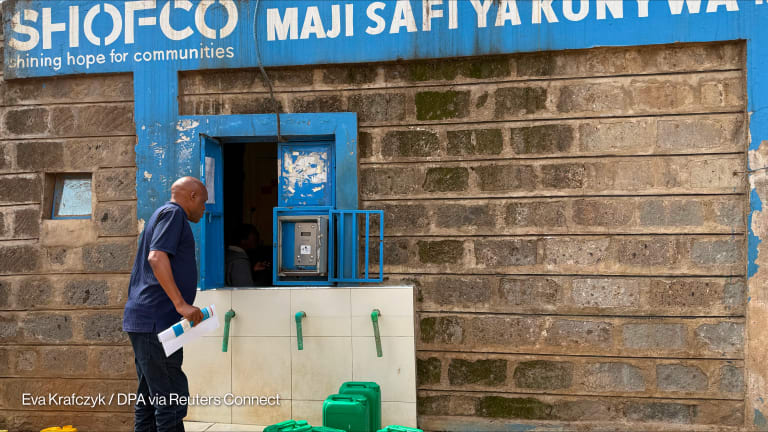Opinion: Yes, global orgs have a future in USAID’s localization agenda
There are many opportunities for large global development implementers in localization efforts — because even when aid is localized, the basic challenges of development still exist.
The U.S. Agency for International Development’s local development agenda is a welcome push for the aid community to reflect on our goals and why we collectively do this work. The mantra has long been to “work ourselves out of a job,” but that has never been a practical proposition for companies built or reliant on their global development practice — we want to keep our jobs, after all. Instead, we should be considering how we can work ourselves into a different job. One where global knowledge and expertise is shared across countries equally, not just from north to south; where clients are those who recognize a need for improvement, and they can access the expertise to support that improvement from whichever organization is best placed to provide it. It’s less about where the money comes from and more about meeting recognized needs. This transition has headwinds. The global aid community tends to favor linear solutions — vaccines prevent disease, better seeds grow better crops — but sustainable change is not so straightforward. Localization requires us to embrace complexity and ambiguity even if it means success is harder to measure. Figuring out how to navigate this is why I chose to leave a long career at USAID. I wanted to be in an environment where we have no choice but to adapt, and where I can use my 20-year background advancing health systems — a complex topic, with no dedicated funding — to help shape what the future of development looks like and how we get there. I have found that Abt Associates, among USAID’s largest implementers in funding, embraces this shift. There are many opportunities for large global development implementers in the future ecosystem of local development — because even when aid is localized, the basic challenges of development still exist. Here are three reasons why: First, knowledge is never uniformly distributed, and it evolves with the problems we’re addressing. Whether due to gaps in experience or uneven diffusion of new approaches and evidence, governments and entities will need access to emerging insights from other sectors and regions. Technical assistance providers can help bridge these gaps. The global aid community tends to favor linear solutions — vaccines prevent disease, better seeds grow better crops — but sustainable change is not so straightforward. --— Second, power dynamics will always exist. Even if we reduce inequities between the global north and south, zero-sum laws that govern resources and influence can undermine progress in any context — a country, community, or institution. Neutral third parties will continue to play a critical role identifying and mitigating these dynamics. Third, as long as development assistance exists, so will the need to account for results. Neither governments, foundations, investors nor collective multilateral institutions will continue to fund other nations’ initiatives without understanding the return on those investments. The ability to evaluate gains to ensure that aid goes to programs demonstrating results — and to my first point, share lessons between them — is an important feature of donor strategies. The need for neutrality in monitoring, evaluation, and reporting remains. The market for these capabilities will be competitive as opportunities diversify. The client base will likewise be bigger, as a growing group of entities decide which partners are best placed for the work they need to do. If international organizations can reframe their value proposition, they will be more relevant in the future. How do we make this shift? We know that advancing localization requires more than, say, local teaming and staffing. These are a few new ways large global organizations need to be thinking about our international work: Reimagining partnerships with local organizations. New approaches go beyond designing awards with grant-making components and deliberately recruiting local partners as sub grantees on our awards. These organizations will do meaningful — and more substantial — work going forward; our focus needs to be on making them as successful as possible, enhancing their existing skills through technical assistance and advisory services, and supporting them to meet USAID’s accountability standards. As with any client relationship, when we engage as thought partners, we become a trusted resource they can call on in the future. Redefining who our clients are. We should be expanding our client base to include foundations, impact investors, and the private sector who likewise want to meaningfully engage with local governments and organizations. NGOs and consulting companies such as Abt can play a key role facilitating and incentivizing deeper collaboration with and investment by the private sector. The blurring lines and opportunities between public and private sectors, aid, and enterprise are seen in the energy and food sectors, for example, where business and development interests often overlap. Rethinking how we implement. We must explore new business models as connectors and facilitators — linking public and private sectors at local, national, and global levels, and across development sectors, rather than limiting ourselves as technical assistance providers. Fundamentally this means thinking and behaving more like a professional services or consulting firm. We can look to the U.S. government’s federal and state contractor ecosystem for other insights on how global contractors and aid could shift along these lines, as countries themselves become clients. These aren’t revolutionary ideas, but they are important ones. I believe advancing localization means finding the balance between rhetoric that takes global implementing organizations out of the equation altogether, in the spirit of “decolonization,” and recognizing that while localization is not about us, it is also not anathema to our interests. The principle of local assistance as an engine for equitable and inclusive social impact, moving people from vulnerability to security and countries from aid recipients to leaders of their own progress, is something all development organizations should support — and it means looking inward at what needs to change.
The U.S. Agency for International Development’s local development agenda is a welcome push for the aid community to reflect on our goals and why we collectively do this work. The mantra has long been to “work ourselves out of a job,” but that has never been a practical proposition for companies built or reliant on their global development practice — we want to keep our jobs, after all.
Instead, we should be considering how we can work ourselves into a different job. One where global knowledge and expertise is shared across countries equally, not just from north to south; where clients are those who recognize a need for improvement, and they can access the expertise to support that improvement from whichever organization is best placed to provide it. It’s less about where the money comes from and more about meeting recognized needs.
This transition has headwinds. The global aid community tends to favor linear solutions — vaccines prevent disease, better seeds grow better crops — but sustainable change is not so straightforward. Localization requires us to embrace complexity and ambiguity even if it means success is harder to measure.
This story is forDevex Promembers
Unlock this story now with a 15-day free trial of Devex Pro.
With a Devex Pro subscription you'll get access to deeper analysis and exclusive insights from our reporters and analysts.
Start my free trialRequest a group subscription Printing articles to share with others is a breach of our terms and conditions and copyright policy. Please use the sharing options on the left side of the article. Devex Pro members may share up to 10 articles per month using the Pro share tool ( ).
The views in this opinion piece do not necessarily reflect Devex's editorial views.
Kelly Saldaña is vice president of systems strengthening and resilience at Abt Associates, where she leads new solutions to integrated, locally driven program design across the company’s global portfolio. Saldaña joined Abt after nearly 20 years at USAID, where she oversaw the agency’s health systems strengthening and capacity-building portfolio and the programming of its $6 billion COVID-19 response.








